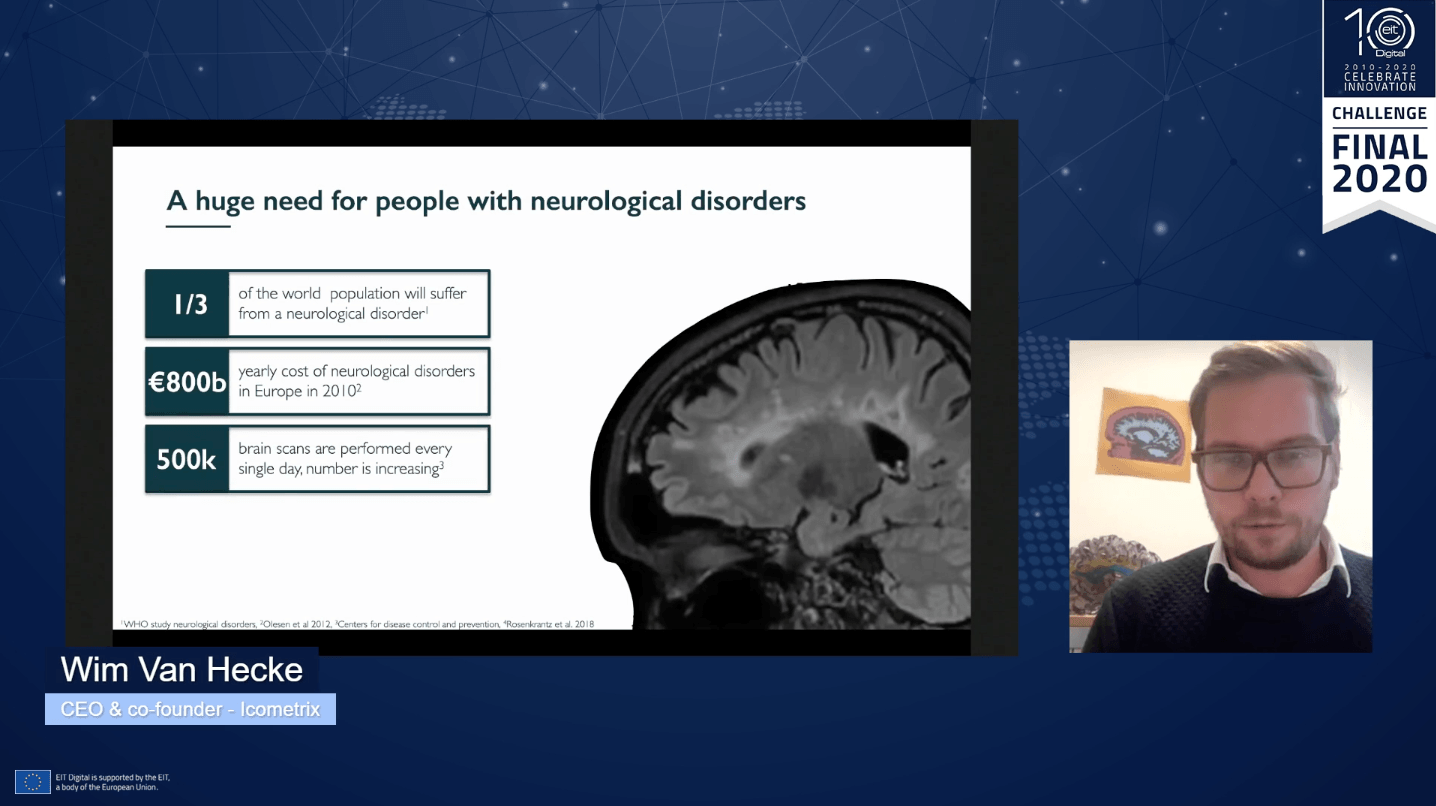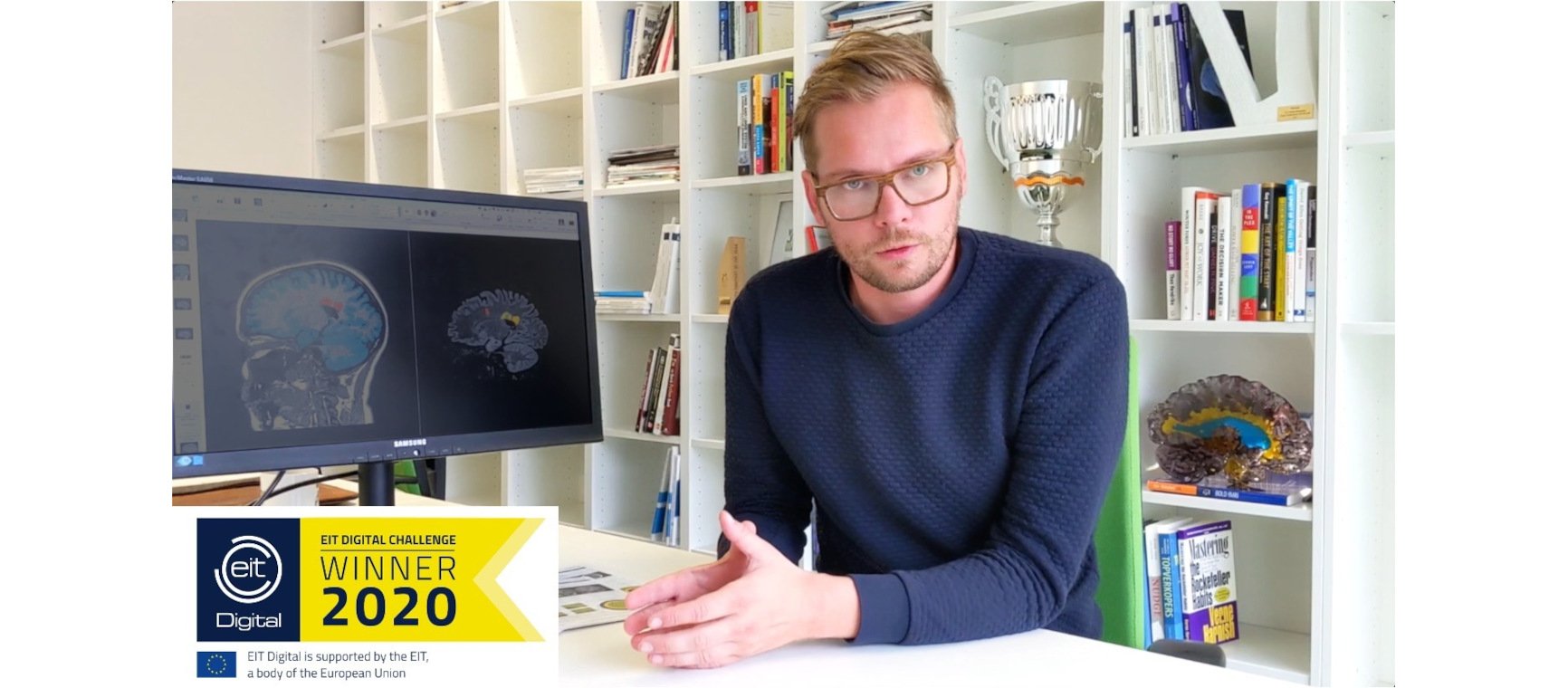Editor’s note: This is a sponsored article, which means it is independently written by our editorial team but financially supported by another organisation, in this case, EIT Digital. If you would like to learn more about sponsored posts on Tech.eu, read this and contact us if you are interested in partnering with us.
The applications for this year's EIT Digital Challenge are closing on May 10, so there's still a few days left for the aspiring European digital deep tech scale-ups to apply. The three best companies will gain 12 months of tailored support from the EIT Digital Accelerator worth €50,000 to scale up their business. On top of that, the first prize winner receives a cash prize of €100,000.
In anticipation of seeing this year's finalists, we wanted to take a look at the winners of the 2020 edition and tell the inspiring story of a startup that helped hundreds of hospitals to diagnose COVID-19 patients when the pandemic hit.
It took the Belgian-based startup Icometrix only five weeks to adjust its brain imaging technology to analyse chest CT scans of COVID patients, get a CE certification, and bring the new tool to hospitals across the world — without charging them a dime.
“As of March 2020, we hadn't ever analysed a lung CT scan,” said Wim Van Hecke, the CEO and co-founder of Icometrix. “But when the pandemic started, we sat down to think what we can do to help, and got that idea. Then we received approval from our board and worked together with King's College in London and the universities of Antwerp, Brussels, Leuven, and Liège (Belgium) to make it happen.”
The resulting software piece, icolung, is still used to analyse hundreds if not thousands of lung images every day. Over time, it has evolved from a pure diagnostic tool to a prognostic one, which can predict the outcome of a patient.
While launching and improving icolung, the company has also worked on its main product, the brain scanning suite icobrain, and went on to win the EIT Digital Challenge.
Ready to scale
Founded in 2011 as a spin-off of the University of Antwerp, icometrix has come up with a way to enhance brain scans with image processing that can give the radiologist better understanding of what they're looking at.
“I saw a lot of potential in using AI to complement the radiologists, to make sure that we take away the boring parts of their work, but also the parts that are difficult for the naked eye,” Van Hecke said. “Humans are really great in pattern recognition, but not as good in quantifying things. For example, saying how many lesions there are on a scan, or what their volume is.”
The company employs around 60 people, most of whom are engineers and researchers working in its Leuven headquarters. Over the years, icometrix has raised €18.2 million to fund the development of its technology and costly regulatory procedures.
It took icometrix a few years of research and working on projects with pharmaceutical biotech companies before it had begun to develop its main product, icobrain. “We worked hard on developing the unique core software and obtaining regulatory clearances. However, during these efforts, we learned that you can have the best solution or software, but if it does not integrate, then nobody will use it,” Van Hecke said. “Hence we have developed a gateway that is installed in the hospital within 15 to 20 minutes, and that connects all relevant cloud applications and systems in the hospital.”
The work paid off at the end, however: the cloud-based software suite is currently being used by hundreds of hospitals and imaging centres all over the world.
Entering the challenge
In 2020, in the middle of the pandemic, icometrix applied to compete in the EIT Digital Challenge, and got shortlisted as one of 20 finalists.
“Someone mentioned the challenge to us in a conversation, and I saw that it was something right up our alley,” Van Hecke said. “The team helped us a lot in preparing our pitch, but also they started making introductions to potential partners even before we officially applied.”
 Wim Van Hecke's pitch during the EIT Digital Challenge 2020 finals
Wim Van Hecke's pitch during the EIT Digital Challenge 2020 finals
In November, Van Hecke pitched icometrix in the finals (held remotely, of course), and became one of the five winners.
“We totally didn't expect that,” he said. “It is also great to see and meet other founders from outside of the healthcare industry who were also working on AI tools. There's always a lot to learn there.”
The big vision
Winning the competition allowed icometrix to enter the EIT Digital Accelerator, a programme tailor-made for scale-ups to support their international growth. Van Hecke mentioned a steady flow of introductions to potential international partners; with EIT Digital being an international organisation, its representatives from everywhere in Europe are in a great position to help a startup scale across the continent.
“A few months have already passed since November — but interactions are not going down at all,” Van Hecke said. “I even have a feeling that the activity is actually going up, as the EIT Digital Accelerator team starts to better understand our needs. I'm very pleasantly surprised.”
With all the support from EIT Digital Accelerator, icometrix keeps working on its product towards the big vision of digital healthcare in general and neurology in particular.
“I'll be a happy man when we can develop a virtual patient for neurology,” Van Hecke explained. “We're all different, diseases act differently in us. For instance, there are no two identical Alzheimer patients, so there's a great need for personalised medicine, but also for big data to identify what the path and outcome could be for a patient.”
Having a “digital patient” to test treatments could solve one of the biggest problems in neurology today.
“For multiple sclerosis, there are 22 disease modifying treatments on the market — but the decision of which one to choose is based on many subjective elements. As a result, many patients end up with suboptimal treatments, which could cause cognitive problems or disability in the future.”
Van Hecke doesn't expect the digital patient technology to arrive in one day as a result of a breakthrough piece of research — but rather be the outcome of an iterative process. Supported by EIT Digital along the way, icometrix is well underway towards this goal — and expects to see it materialise within the next five years.
If you want to try your hand at showcasing your own strengths in the EIT Digital Challenge 2021 competition, check here for more information and to apply online.



Would you like to write the first comment?
Login to post comments